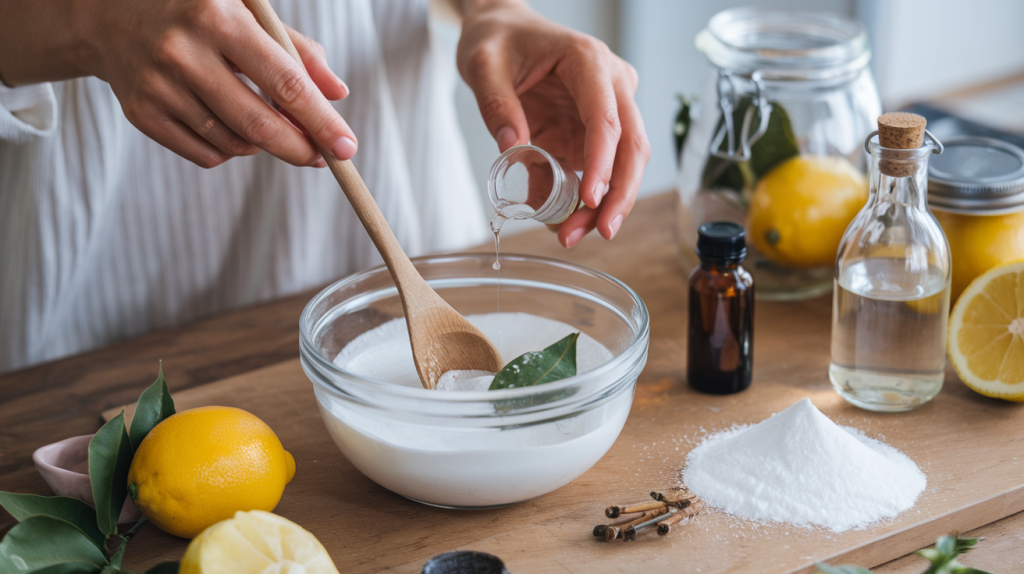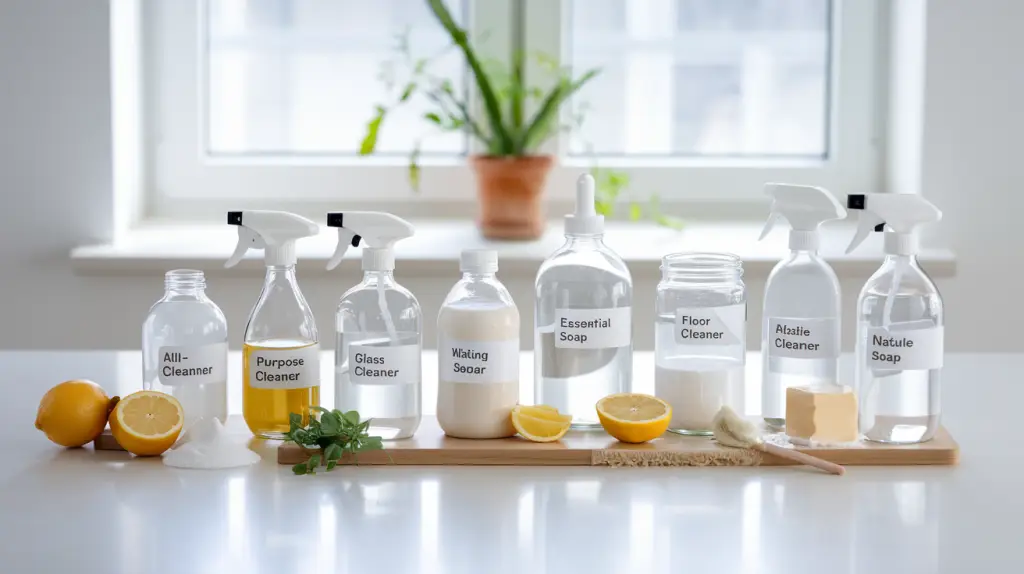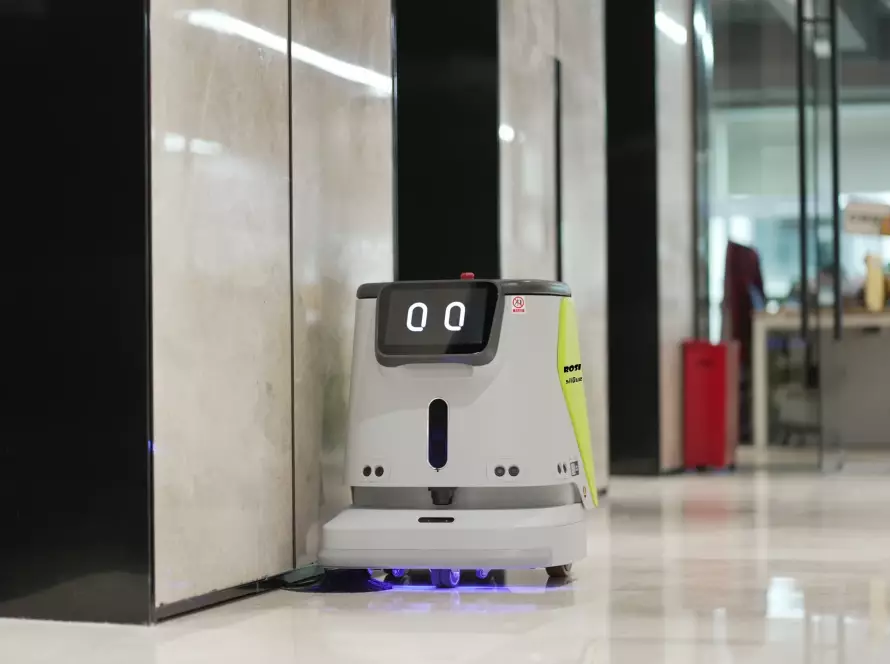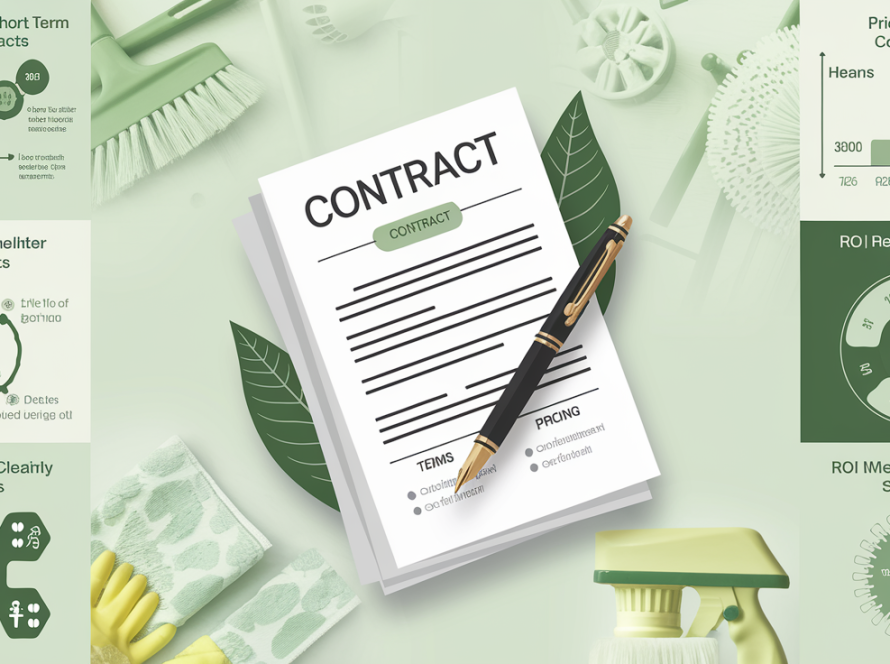Table of Contents
ToggleIn today’s eco-conscious world, more consumers are seeking sustainable alternatives to everyday products, including cleaning supplies. For small and startup eco-cleaning businesses, the demand for non-toxic, natural solutions is a huge opportunity. Offering customers the option to switch from harsh chemical cleaners to natural, homemade alternatives can set your business apart from the competition.
Homemade eco-friendly cleaning products not only reduce environmental impact but also offer a safer option for families and households sensitive to chemicals. By using simple, natural ingredients, these products are easy to make, affordable, and just as effective as traditional cleaners. For businesses looking to incorporate sustainability into their products and services, creating your own line of DIY eco-friendly cleaning products is a win-win for both your brand and the environment.
Essential Ingredients for DIY Eco-Friendly Cleaning Products
To create eco-friendly cleaning products, all you need are a few simple, natural ingredients that are likely already in your pantry or easily sourced locally. These ingredients are safe for both the environment and your customers, making them an excellent choice for a sustainable cleaning business. Here are the most common ingredients used in DIY eco-cleaning recipes:
White Vinegar: An excellent natural disinfectant, vinegar cuts through grease, removes stains, and deodorizes. Its acidity makes it effective at breaking down mineral deposits and grime.
Baking Soda (Sodium Bicarbonate): This powerful yet gentle scrubbing agent is ideal for deodorizing, cleaning surfaces, and neutralizing odors. It’s a must-have for tackling tough stains and grime without scratching surfaces.
Castile Soap: Made from vegetable oils, castile soap is a gentle yet highly effective cleaner. It can be used for everything from washing dishes to scrubbing floors, and it’s biodegradable.
Lemon Juice: Naturally antibacterial and packed with cleaning power, lemon juice is a great deodorizer and stain remover. Its high acidity helps dissolve grease and hard water stains, leaving surfaces fresh.
Essential Oils: Not only do essential oils like lavender, tea tree, eucalyptus, and lemon add a pleasant fragrance to your cleaning products, but many of them also possess antibacterial, antiviral, and antifungal properties. Essential oils boost the cleaning power of your products while promoting wellness.
Washing Soda: Similar to baking soda but more alkaline, washing soda is a heavy-duty cleaner perfect for tackling stubborn stains, grime, and soap scum. It’s a go-to for laundry detergents and tough cleaning jobs.
Hydrogen Peroxide: A natural bleach and disinfectant, hydrogen peroxide is effective for cleaning and sanitizing, especially in bathrooms and kitchens.
These ingredients not only offer excellent cleaning properties but are also non-toxic, biodegradable, and easy to source. For businesses, highlighting the use of such natural ingredients can be a powerful marketing tool, appealing to eco-conscious customers who want sustainable and safe cleaning solutions.
Basic Tools and Supplies You’ll Need
Once you have your ingredients, it’s essential to gather the right tools and containers for making and storing your DIY cleaning products. Here’s a quick checklist of the basic supplies your business will need to start making eco-friendly cleaners:
Reusable Spray Bottles: Opt for glass or high-quality, BPA-free plastic spray bottles to store your liquid cleaners. Label them with the product name and key ingredients to keep things organized and professional.
Jars and Containers: Wide-mouth jars or glass containers with lids are great for storing powdered cleaners, scrubs, or any mixture that needs to be kept dry.
Mixing Bowls and Spoons: Use stainless steel, glass, or bamboo mixing bowls and spoons to blend your ingredients. Avoid plastic mixing tools as they may absorb essential oils over time.
Measuring Cups and Spoons: Accurate measurements are key to ensuring consistency in your cleaning products. Use standard measuring cups and spoons to maintain quality control, especially if you plan to scale your production.
Funnels: For easy and mess-free pouring of liquids into containers, keep a set of funnels on hand.
Microfiber Cloths and Sponges: If you’re testing your products in-house or offering them in a bundle, pair your cleaners with reusable microfiber cloths or eco-friendly sponges. These help reduce waste and reinforce your commitment to sustainability.
Labels and Packaging: As a business, presentation matters. Invest in eco-friendly packaging and labels that align with your brand’s values. Recycled paper labels and biodegradable packaging can further emphasize your business’s dedication to eco-friendliness.
Storage and Safety Tips:
- Store products in cool, dry places away from direct sunlight to maintain their potency.
- Label containers with clear ingredient lists and expiration dates, especially if you’re selling them to customers.
- Ensure proper handling of certain ingredients like vinegar and hydrogen peroxide, which can degrade over time or lose efficacy if exposed to light and air for long periods.
With the right tools and eco-conscious packaging, your startup or small business can create professional-quality, eco-friendly cleaning products that not only perform well but also look and feel premium to your customers. This will set your brand apart in a growing market focused on sustainability.

Step-by-Step Recipes for DIY Eco Cleaning Products
Creating eco-friendly cleaning products is simple, and once you’ve mastered the basics, you can experiment and develop customized solutions tailored to your customers’ needs. Below are five foundational DIY cleaning recipes that your business can offer, whether you’re selling them directly or promoting them to engage eco-conscious customers.
1. All-Purpose Cleaner This versatile cleaner works on a variety of surfaces, from countertops to appliances, and is perfect for everyday cleaning.
Ingredients:
- 1 cup white vinegar
- 1 cup water
- 10-20 drops of essential oil (e.g., lemon, tea tree, or lavender for scent and antibacterial properties)
Instructions:
- Combine vinegar and water in a spray bottle.
- Add essential oils for fragrance and antibacterial action.
- Shake gently and use as needed to clean surfaces.
Usage Tip: Avoid using this on natural stone surfaces like granite or marble, as vinegar may damage them. Substitute with alcohol-based cleaners for these surfaces.
2. Natural Glass Cleaner Achieve streak-free windows and mirrors with this simple yet effective recipe.
Ingredients:
- 1/4 cup white vinegar
- 1/4 cup rubbing alcohol
- 1 tablespoon cornstarch (for added shine)
- 2 cups water
- 10 drops of essential oil (optional)
Instructions:
- Mix the vinegar, alcohol, and cornstarch in a spray bottle.
- Add water and essential oils, if desired.
- Shake thoroughly before each use to ensure the cornstarch is evenly distributed.
Usage Tip: Spray the solution onto glass and wipe with a lint-free cloth or newspaper for a streak-free finish.
3. Eco-Friendly Bathroom Cleaner This cleaner is perfect for scrubbing sinks, tubs, and tiles while disinfecting and deodorizing naturally.
Ingredients:
- 1/2 cup baking soda
- 1/4 cup liquid castile soap
- 10 drops tea tree oil (for its antibacterial properties)
- 10 drops eucalyptus oil (optional for fragrance)
- Water (to achieve the desired consistency)
Instructions:
- Combine baking soda and castile soap in a bowl.
- Add essential oils and mix thoroughly.
- Slowly add water to reach a paste-like consistency.
- Apply the paste to bathroom surfaces using a sponge, scrub, and rinse.
Usage Tip: This scrub is gentle enough for tiles and grout, but avoid using it on delicate surfaces like marble.
4. Homemade Floor Cleaner Whether you’re cleaning hardwood, tile, or laminate, this floor cleaner is safe and effective.
Ingredients:
- 1/2 cup white vinegar
- 1 gallon warm water
- 10 drops lemon essential oil (optional for scent)
Instructions:
- Mix vinegar and warm water in a bucket.
- Add essential oil for a fresh lemon scent.
- Mop floors as usual, ensuring they dry fully to avoid water damage.
Usage Tip: For hardwood floors, use the mixture sparingly and ensure the mop is only damp, not soaking wet.
5. DIY Air Freshener Offer your customers a chemical-free way to freshen their homes with this simple air spray.
Ingredients:
- 1/2 cup water
- 1/2 cup rubbing alcohol or vodka (helps the scent linger longer)
- 15-20 drops of your favorite essential oils (e.g., lavender, eucalyptus, or citrus)
Instructions:
- Combine water and alcohol in a spray bottle.
- Add essential oils and shake well.
- Use as an air freshener or to lightly mist fabrics.
Usage Tip: Spray lightly on curtains, pillows, or furniture to eliminate odors without synthetic fragrances.

Benefits of Using Eco-Friendly Cleaning Products at Home
Switching to eco-friendly cleaning products brings significant advantages, not just for the environment but also for the health of your customers and their homes. Here’s why your business should emphasize these benefits when promoting your DIY cleaning products:
1. Environmental Impact Traditional cleaning products often contain harsh chemicals that, when washed down the drain, contribute to water pollution and harm aquatic ecosystems. In contrast, eco-friendly cleaning products are biodegradable and use natural, non-toxic ingredients that break down safely in the environment. By promoting these products, your business can help reduce the carbon footprint of households.
2. Improved Indoor Air Quality Conventional cleaning solutions can release volatile organic compounds (VOCs) into the air, which may lead to respiratory issues and contribute to indoor air pollution. Natural, homemade cleaning products, on the other hand, are free of these harmful chemicals, helping to create a healthier living environment for your customers.
3. Safety for Families and Pets Eco-friendly cleaners are made from non-toxic ingredients, making them safer for use in households with children and pets. You can market your products as a safe alternative that reduces the risk of skin irritation, allergic reactions, or accidental poisoning.
4. Cost-Effectiveness DIY cleaning products often cost a fraction of store-bought cleaners because they use simple, affordable ingredients like vinegar, baking soda, and castile soap. This is a selling point that will appeal to cost-conscious customers looking for more budget-friendly options.
By focusing on these benefits, your business can build a strong brand narrative around health, safety, and sustainability, which will resonate with a growing audience of eco-conscious consumers.
Customizing Your Cleaning Recipes with Essential Oils
One of the easiest ways to differentiate your DIY cleaning products is by customizing them with essential oils. Not only do essential oils add a pleasing aroma, but many of them also have powerful antibacterial, antiviral, and antifungal properties that enhance the cleaning power of your solutions. Here are a few popular essential oils you can use in your recipes:
1. Lavender Oil Lavender is known for its soothing fragrance, making it a great choice for all-purpose cleaners or air fresheners. It also has natural antibacterial properties, making it effective for disinfecting surfaces.
2. Lemon Oil Lemon oil is a natural degreaser and disinfectant. Its fresh, citrusy scent is perfect for kitchen cleaners and floor mopping solutions, giving homes a refreshing clean smell.
3. Tea Tree Oil Tea tree oil is one of the most powerful essential oils for cleaning, with strong antibacterial, antiviral, and antifungal properties. It’s ideal for bathroom cleaners, mold removal, and disinfecting high-touch areas.
4. Eucalyptus Oil Known for its fresh, clean scent, eucalyptus oil is a great addition to products aimed at deodorizing or clearing the air. It also has antimicrobial properties, making it suitable for all-purpose cleaners.
5. Peppermint Oil Peppermint oil has a crisp and invigorating scent that works well in bathroom cleaners or glass cleaners. It also acts as a natural pest deterrent, which is an extra benefit for households.
How to Safely Use Essential Oils in Cleaning Products:
- Always dilute essential oils with water or a carrier like vinegar or alcohol to avoid overwhelming scents or skin irritation.
- Store essential oil-based products in dark, glass containers to maintain their potency and prevent degradation over time.
- Experiment with different oil blends to create signature scents that align with your brand’s identity and customer preferences.
By customizing your products with essential oils, your business can offer a wide range of eco-friendly cleaning solutions that cater to diverse customer needs while reinforcing your commitment to sustainability and wellness.
Tips for Transitioning to a Greener Cleaning Routine
As a small or startup eco-cleaning business, guiding your customers through the transition to eco-friendly cleaning is key to building trust and loyalty. Many people may be hesitant to switch from traditional products, so offering practical tips and education will encourage a smooth and confident transition. Here are some tips to help your customers embrace a greener cleaning routine:
1. Start Small Encourage customers to begin by replacing one or two of their most-used cleaning products with eco-friendly alternatives. For example, swapping an all-purpose cleaner or glass cleaner is an easy and impactful first step.
2. Use Up Old Products Before Replacing Them Help customers avoid waste by suggesting they use up their existing chemical cleaners before switching to your eco-friendly options. This minimizes environmental impact and eases the transition.
3. Offer Starter Kits Create eco-cleaning starter kits that include a range of essential cleaning products, such as an all-purpose cleaner, glass cleaner, and air freshener. These kits help customers see how effective and versatile eco-friendly cleaning can be.
4. Introduce Reusable Cleaning Tools Encourage customers to pair your eco-friendly products with sustainable cleaning tools like microfiber cloths, reusable sponges, or compostable scrub brushes. This reinforces the zero-waste mentality and reduces reliance on disposable products like paper towels.
5. Educate on Product Effectiveness Some customers may doubt that natural cleaners are as powerful as commercial brands. Share data or testimonials that demonstrate the effectiveness of your DIY eco-friendly products, especially when it comes to antibacterial properties, grease-cutting power, and stain removal.
6. Build a Routine Encourage customers to adopt a cleaning routine that incorporates eco-friendly practices, like regularly cleaning with non-toxic products to prevent the build-up of grime and dirt. This can make cleaning easier over time and less reliant on harsh chemicals for deep cleaning.
By offering these transition tips, your business can help customers feel confident in their choice to switch to greener cleaning products, ensuring they stick with their eco-friendly habits in the long term.

Frequently Asked Questions (FAQs)
To address common concerns and questions that may arise when introducing DIY eco-cleaning products, here are some FAQs that you can provide to your customers:
Q: How long do DIY eco-friendly cleaning products last? A: Most DIY cleaners can last several months if stored properly in a cool, dark place. Some products, like those containing vinegar or alcohol, have a longer shelf life. Products with water or hydrogen peroxide should be used within a few weeks to maintain their effectiveness.
Q: Are homemade cleaners as effective as store-bought ones? A: Yes, when formulated correctly, natural cleaning products can be just as effective. Ingredients like vinegar, baking soda, and essential oils have strong antibacterial, antifungal, and degreasing properties that rival commercial cleaners.
Q: Can I use DIY cleaners on all surfaces? A: Always check before using DIY cleaners on delicate surfaces like natural stone, marble, or untreated wood. For these surfaces, it’s best to avoid acidic ingredients like vinegar. Instead, opt for pH-neutral solutions like mild soap and water.
Q: Are eco-friendly cleaners safe for pets and children? A: Yes, the natural ingredients used in eco-friendly cleaners are typically much safer for children and pets compared to chemical cleaners. However, always keep cleaning products out of reach of children and pets, and dilute essential oils to avoid any potential irritation.
Q: Do DIY cleaning products leave residue? A: No, when used properly, DIY cleaning products should not leave a residue. It’s important to follow the recommended recipes and avoid using too much product. For best results, wipe surfaces with a damp cloth to remove any excess cleaner.
These FAQs can help alleviate customer concerns, making it easier for them to adopt your eco-friendly cleaning products with confidence.
Offering eco-friendly cleaning products is not only beneficial for the environment but also positions your small or startup business as a leader in sustainability and wellness. By educating your customers on the benefits of these products, providing easy-to-follow recipes, and helping them transition to greener habits, you can build a loyal customer base that values both effectiveness and environmental responsibility.
Encourage your customers to take the first step towards a greener home by trying one of your DIY eco-cleaning recipes. Highlight the cost-saving benefits, the safety for their families, and the positive impact on the environment. As more consumers become aware of the harmful effects of chemical cleaners, your business can be at the forefront of the eco-friendly movement, offering solutions that are safe, effective, and kind to the planet.



